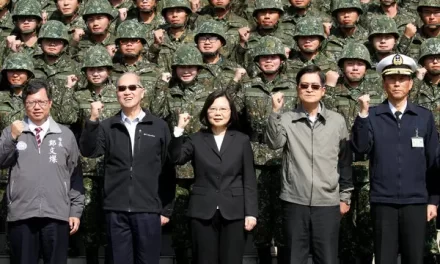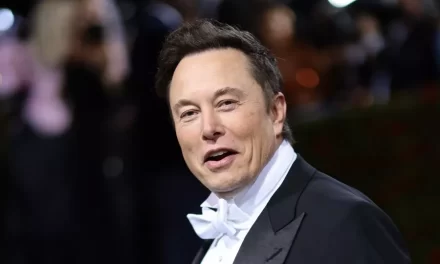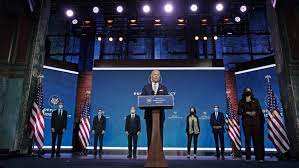by Bradley A. Thayer Lianchao Han
 The NATO summit in Brussels in June and its call for a new Strategic Concept for adoption in 2022 to address the threat posed by China compels the question of why it took this long for the alliance to recognize the threat that has been growing year after year. The rise of China has been the elephant in the room of international politics for decades. French president Emmanuel Macron’s remarks at the summit that “NATO is an organization that concerns the North Atlantic, China has little to do with the North Atlantic” is to continue a strategic myopia that has contributed to China’s rise. The German Christian Democratic Union leader and expected chancellor after the September elections, Armin Laschet, has issued warnings over a new Cold War with China that are similarly shortsighted.
The NATO summit in Brussels in June and its call for a new Strategic Concept for adoption in 2022 to address the threat posed by China compels the question of why it took this long for the alliance to recognize the threat that has been growing year after year. The rise of China has been the elephant in the room of international politics for decades. French president Emmanuel Macron’s remarks at the summit that “NATO is an organization that concerns the North Atlantic, China has little to do with the North Atlantic” is to continue a strategic myopia that has contributed to China’s rise. The German Christian Democratic Union leader and expected chancellor after the September elections, Armin Laschet, has issued warnings over a new Cold War with China that are similarly shortsighted.
China’s growth makes it a global power, and one that is able to project its power into the North Atlantic Beijing has employed its economic and diplomatic influence from the peripheries of Europe, including Greenland, Iceland and Greece, to its economic heart in France, Germany, and the UK. Studies show China has deeply infiltrated Europe and uses its coopted European elites to advance Beijing’s agenda. Greater Chinese coercive power, including a military presence, will follow on the heels of its economic and diplomatic influence.
Macron may be fearful of NATO losing a focus on the Russian threat or of the costs of acknowledging the China threat. But Russia and China are connected, a stronger China might embolden Russia to challenge the West’s interests. A weaker China would not provide Moscow with that assurance. Despite Mr. Macron’s reluctance, NATO needs to have an important role in the Sino-American confrontation. This is because China is a threat to the United States and U.S. position in the world. It is the U.S. position in the world that sustains NATO as a credible and potent alliance that deters Russian aggression and ensures that Western values are sustained.
The rise of China is unlike any challenge the alliance has confronted. To a considerable degree, this is because there was a disparity in the comprehension of the threat posed by Beijing. For most alliance members, the rise of China was perceived as a positive and profitable economic development and not a security threat. Divergent conceptions of the China threat show that some European leaders fail to see China’s strategic intent which is to weaken the United States by dividing the EU. This divide-and-conquer approach only advantages China and permits Beijing to seek its world hegemony without a major obstacle.
While Macron and Laschet might not want to recognize the fact, China’s rise also entails the explicit rejection of fundamental Western norms and values held by NATO members. While there have been consistent and sustained violations of Western norms in the realm of human and civil rights since the Chinese Communist Party came to power in 1949, of particular importance today is China’s genocide against Kazakh, Kyrgyz, and Uighur Muslims, the displacement of the Tibetan people, and the lack a strong culture of anti-racism within China.
So long as NATO heads do not recognize the “human rights gap” and the “racism gap” between the West and China, the situation opens the window for China to divide the Western alliance. In this period of intense security competition with the United States, China seeks to weaken the United States by isolating it from as many of its allies as possible.
To prevent this, NATO member state leadership must recognize that U.S. power is the foundation of the Western order and that China’s threat to the United States is a threat to NATO. Additionally, NATO strengthening its normative component aids the alliance and serves as a common bond uniting its members. The normative aspect of the NATO alliance has had a powerful effect on its members in the Cold War, such as Greece, Portugal, and Turkey. NATO needs to recall its past and advance the normative component once again recognize that China violates fundamental Western norms and therefore is beyond the pale as a member of the international community.
The leadership of all NATO states must perceive that NATO is not simply a response to a threat. It is a major political, military, and normative force not only in the transatlantic area but globally. Its normative power in advancing human rights is significant and can ensure that the alliance promotes its shared norms, which serve to illuminate its differences with the governments of China and Russia.
NATO states must recognize China’s hidden threat to Europe and the shared political principles that serve as the foundation of its political system. Countries in the West respect human rights and have fundamentally transformed their societies in a positive direction to develop strong cultures of anti-racism. To ignore the threat posed by China—no matter how powerful it is economically and how lucrative engagement is—means that the strengthening of the human rights regime and progress in the development of cultures of anti-racism is arrested and opens the door to their reversal in global politics.
This article first appeared in National Interest on July 3, 2021























